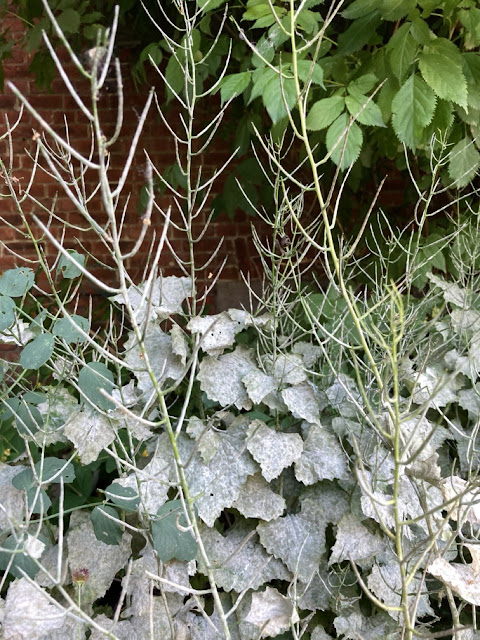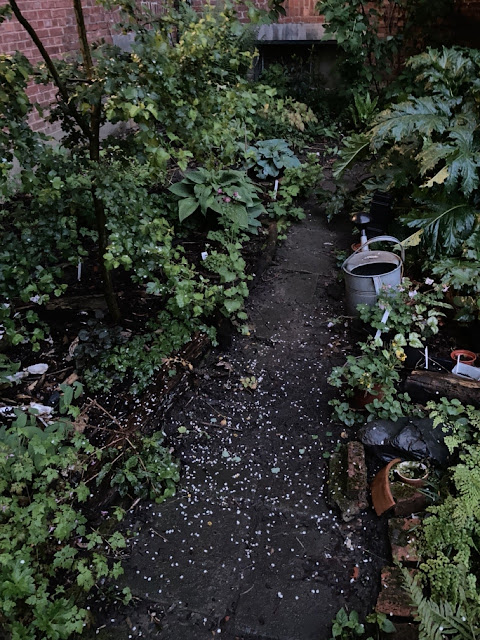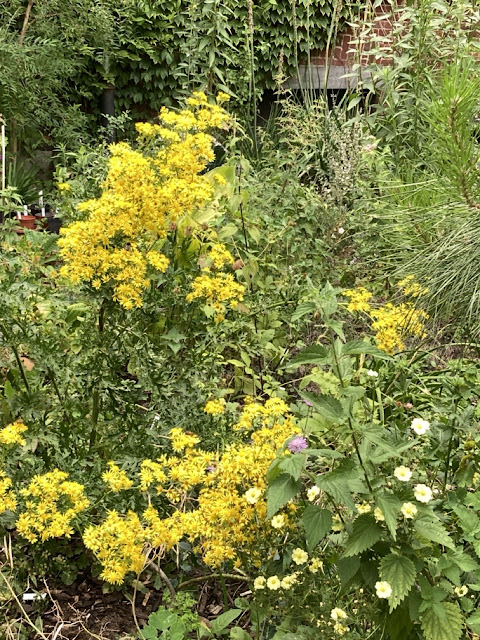2025 is the last year for Gesamthof. We knew this location was temporary before we started to garden and it was still worth it, but now the time has come to end this beautiful garden. With the support of MORPHO and Extra City kunsthal we invite the LGBTQIA+ community to relocate plants to your own gardens.
 |
| The trans & lesbian garden in 2024 |
We see this as an opportunity to get together and garden. The trans & lesbian garden is a home to minorities: plants and insects that are part of the ecology of Borgerhout. During the queer gardening Sundays the wild plants growing in Gesamthof will be taken out of the garden, and shared for a better future. This way the garden can live on in many other gardens.
Queer gardening Sundays:
January 26: winter is ideal to move trees and shrubs: Hawthorn, Dog roses, Ferns, Beech, Rowan...
February 23: some of the trees and shrubs can go, and we can start to dig up early flowers: Snowdrops, Hellebore, Violets, wild garlic, forget-me-not... early winter flowering plants.
March 30: lots of spring flowers will have appeared by now, little Dog violets, lesser Celandine, Crocus, and also early summer flowers appear above ground: Salomon's seal, broad-leaved enchanter's nightshade, Clematis old man's beard, Alchemilla Xantochlora, Paris, Anchusa, Comfry...
April 27: summer plants are not yet flowering, let's move them into new gardens: Galium verum, ragwort, Digitalis, Libertia, Schizostylis coccinea, Thalictrum, and the little pools with waterplants, snails and dragonfly offspring. (in a way we're lucky there are no frogs or newts living in this garden)
May 25: the summer plants are ready to go now, during summer it is too hot and not ideal to move plants. We take a summer break to return in autumn.
September 21: late summer, the very last plants, who have not found a new home by now, can be potted up and given away.
October 26: this Sunday gardening is open for everyone: queer & non-queers, friends, family, neighbours, kin, join us for the last gardening Sunday at the Gesamthof. The remaining plants, the last shrubs and trees that still remain, all will be given away. Also left over garden bits and bobs, garden materials, reusable labels, pieces of string, a lucky charm, a souvenir... everything can go. At 15h we have a small garden tour and from 16 - 18h we invite you to the Homesick Tea Gathering. Please make a reservation if you'd like to join the tea event. Guest artists to be announced.
 |
| The Gesamthof in autumn 2024 |
Practical:
Entrance is via Extra City, Provinciestraat 112, 2018 Antwerp https://extracitykunsthal.org/
Queer gardening sessions are from 14 - 18h
There is a garden tour at 15h (about 45 minutes) to highlight the plants growing in this season.
The garden, plants and tour are free, and entrance is free via kunsthal Extra City. Please mention you'd like to go to the garden at the entrance of kunsthal Extra City.
Nice to know: Extra City organizes a guided tour (for queers and non-queers) on the last Sunday of the month at 14h and you can combine the tours.
When the bar at kunsthal Extra city is closed, tea is provided at the gardening table.
Unfortunately the garden is only accessible via a small staircase (6 steps) and not wheelchair friendly.
We'll garden in all kinds of weather.
Contact: for more information please contact me at elinewoolpublishing (at) gmail.com
This program is made with the generous support by Morpho who selected me for a research residency with this garden project. I would like to thank everyone who is helping to make this happen.
The Gesamthof garden has a contemporary gardener's approach to inclusive language: we use porous words, open semantics like patches and rhizomes, we like to communicate collective practices, and our definitions have frayed edges. Nature's playful approach to gender and sexuality is reflected in our language and practices.
This garden supports minorities, both plants and animals, including humans. This project started as Gesamthof, evolved to lesbian garden and includes trans people with a warm welcome. The words are highlighting practices, not exluding others. In reality we welcome all kinds of species, and use gardening to practice decolonial thinking.
With decolonialism we express 'to give back the land to whom belongs with this land' in ecology this includes a wide variety of species. It also requests good care & response-ability towards nature and land practices.
 |
| Not all the plants are wild, this is a hybrid Epidemium. |
 |
| Garlic mustard, here gray at the end of the season, is a larvae food plant for some very nice butterflies, it will self seed throughout the garden at the edge of hedges. |
 |
| The Scrophularia auriculata or shoreline figwort, is in symbiosis with wasps and when this plant grows in your garden the attracted wasps will keep the aphid population under control. |
 |
| Some of the plants are extremely poisonous for human animals, if you have children who would put plants in their mouth you might want to check before bringing these to your garden. |
 |
| Some plants, like this wild garlic (daslook) are edible and will give you something exciting to taste. |
 |
| Our plants come from lots of different places, if we still have the label you can take it with you. |
 |
| We'll also help to determine what kind of soil type / light preferences might work. |
 |
| Some of the plants in the garden arrived on their own, they are loved and cared for just as for the others, because they are living within the local ecology and support many species. |
 |
| Some of the plants are very old, like this 20 year old fern who has moved from studio to studio with me, and now is no longer willing to be grown in a pot any more. |
 |
| The intricate connections between the plants make this garden unique, but new connections can be made, and we hope this garden will live on, beloved by the queer community & friends. |






